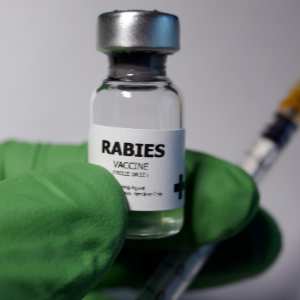

Stop Rabies Before It’s Too Late
Listen to this article in Sotho:
A bite that’s MUCH worse than the bark…
When it comes to rabies, it’s not too late…until it’s too late.
In the summer of 2021, South Africa had a marked increase in fatal rabies cases. The first human rabies case for 2022 has been reported.
What is rabies exactly?
Rabies is a zoonotic disease, so it’s a virus that can spread from animals to humans directly. It affects the brain and causes the death of its host. The disease can have an incubation period of anything from 11 days to 2 years.
The virus is in the saliva and is spread by the bite of an infected animal.
In South Africa, people are usually infected by dogs, but other animals such as cats, mongooses, jackals and other wild animals can also infect people.
Although summer is the high season for rabies, (the virus does not fare well in cold weather), proper education about it is never out of season.
The problem with rabies is that it is a largely silent threat.


PEP is the way to go!
Science has given us amazing solutions to this threat in the form of post exposure prophylaxis (PEP). PEP is an injection of Human Rabies Immunoglobin, and the Rabies Vaccine is administered on the day of exposure, with repeats of the vaccine on day 3, 7 and 14. If this treatment course is sought and completed, it is nearly always effective in preventing the spread of the virus.
It’s too late if you start showing symptoms.
Once clinical symptoms appear, rabies is virtually 100% fatal. There is no cure for rabies. Once the virus has spread through the body, it is deadly.
Where does rabies come from?
In up to 99% of cases, domestic dogs are responsible for rabies virus transmission to humans, but cats can pose just as high a risk.
Other carriers of rabies include carnivorous wild animals and bats.
| Error, group does not exist! Check your syntax! (ID: 20) |
How do I stay safe?
The number one way to curb the spread of the disease is to have all your own domestic animals vaccinated.
Furthermore, teach children to avoid close contact with unknown and wild animals and also to report any bite or scratch by these animals immediately.
Seeking treatment in the form of PEP is the only way to keep yourself safe from rabies once you have been exposed.
Cleaning the bite wound with soap and water is important but not sufficient to prevent the spread of the virus.
Rabies vaccines are given to high-risk people such as veterinarians, animal handlers and people who work with animals.










